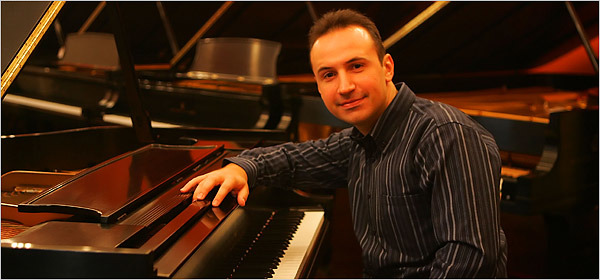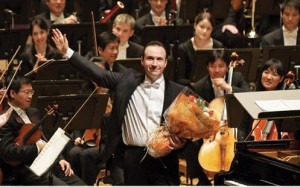 Simon and I met in our teens, before he became known to the world as ‘Trpčeski’. As a person, he is full of joy, warmth and sincerity; as a pianist, he is natural, charismatic and phenomenal. Wherever he appears, he shines like the golden sun, as if he was the reincarnation of the Macedonian King, Alexander the Great. The youngest of three children, with his father a judge and his mother a pharmacist, Simon Trpceski showed talents in music at an early age. He pursued his music studies with Boris Romanov in Skopje and later took the world by storm with his dazzling performances, from Carnegie Hall in New York, to the Royal Festival Hall in London, and to the Hong Kong Cultural Centre, where he finished the complete Rachmaninov cycle with the Hong Kong Philharmonic Orchestra. Here, he talks about his career, his country, his hidden talents and his loving family.
Simon and I met in our teens, before he became known to the world as ‘Trpčeski’. As a person, he is full of joy, warmth and sincerity; as a pianist, he is natural, charismatic and phenomenal. Wherever he appears, he shines like the golden sun, as if he was the reincarnation of the Macedonian King, Alexander the Great. The youngest of three children, with his father a judge and his mother a pharmacist, Simon Trpceski showed talents in music at an early age. He pursued his music studies with Boris Romanov in Skopje and later took the world by storm with his dazzling performances, from Carnegie Hall in New York, to the Royal Festival Hall in London, and to the Hong Kong Cultural Centre, where he finished the complete Rachmaninov cycle with the Hong Kong Philharmonic Orchestra. Here, he talks about his career, his country, his hidden talents and his loving family.
ST: Simon Trpčeski
JL: Jenny Lee
JL: Looking back at your career, what were the significant turning points?
ST: Well, the London World Piano Competition was a turning point because it helped me to understand more about the phase of my development at that point. I had lots of experience with competitions before that, but when you got to the final round of such a great competition like that one, and you have a chance to play in a great hall like the Royal Festival Hall, and with one of the world’s best orchestras, the London Philharmonic, you certainly think differently afterwards. A year after the competition, I had a chance to give my debut at the Wigmore Hall, which was certainly memorable because it was another break-through in my career. It was a wonderful feeling to play there and the atmosphere was warm and suitable for a great classical music evening. The enthusiastic reaction of the audience was also a great motivation and inspiration for the future.
JL: Who are your favourite pianists and why?
ST: Oh, that is a very difficult question because there are many. Great respect for Rachmaninov, Prokofiev and Busoni for their endless capabilities; going further, Kempf, Horszowski, Czerny-Stefanska, Arrau, Lipatti, Gould, Brendel. I would point out also Ashkenazy, Perahia and Radu Lupu for their natural approach to the music. No doubt that Rubinstein, Richter and Gilels have special place for their cultivated and warm sound. Few other names certainly deserve attention like Lazar Berman, Rudolf Firkusnyi, Deszo Ranki and Andras Schiff, as well as Maria Joao Pires, Zimmerman, Pogorelich and Uchida. Paul Lewis, Leif Ove Andsnes and Marc Andre Hammelin are also names that I greatly respect.
I am sure I am missing someone. Well, we are all different and that is why the musical world as well as life, is not boring, but interesting.
JL: What do you love about being a musician? What is your hardest challenge?
ST: I love the freedom. I love the fact that I can breathe freely. And there is no better way to express and feel through the length of a single sound. You can imagine the pleasure from a harmony of many sounds with different colors. It is probably a close description of heaven.
Hardest challenge, but at the same time, a great self exploration is to always keep the high level and true to the music, no matter how different the style of the music piece. If you survive the challenge of your self-criticism and the test of the audience, then you probably are fine.
 JL: Macedonia was the home for Alexander the Great. Would you tell us more about your beloved country? And Skopje?
JL: Macedonia was the home for Alexander the Great. Would you tell us more about your beloved country? And Skopje?
ST: When I have to describe Macedonia in brief, I say that it is a Bible country, country of Alexander the Great, therefore enormous history, wonderful food, great wine, people with music and warmth in their hearts, and beautiful women. What else can one ask for?
Skopje is my home town and the capital of Macedonia. It has witnessed many cultures from Justinianus, through the Ottoman Empire till the modern time, with the old/new buildings, museums, theater, concert hall and monuments.
Come, you will enjoy it 100%.
JL: Apart from playing classical music, I know that you compose pop songs. Any other hidden talent?
ST: Haha, well writing pop songs is my love. I do it for pleasure, but when I have time to do it, I do involve myself wholeheartedly because I appreciate the art in pop music. I do have couple of hits back home and that makes me happy because people know them and like them. My brother Jovan wrote the lyrics. I don’t do that regularly, only from time to time.
I love football although I don’t play it as often as I did when I was a child. I wasn’t bad when I was younger. I can play accordion a bit. That is my first love. And I can sing fairly well.
JL: Your family would sometimes go on tour with you. How have they supported you?
ST: Any way you can imagine. They have supported me more that they could, with the very modest circumstances, in which me, my sister and my brother were growing up. For them to study economy or law while I was “pounding” Prokofiev’s Toccata in the living room of our small apartment, was certainly not easy. Also, in a country that doesn’t have a strong tradition in classical music, and that didn’t have the real sense of support, was very difficult. That is why a few family friends supported my trips abroad because the resources of my parents were limited. I am happy their trust was paid-off.
The trust, love, warmth, and support from my family are priceless and that is why I consider my success as their success too. I don’t live in the clouds, and I don’t forget the roots and the people who have shown respect during my most difficult periods.
JL: What are the 3 things that you cannot live without, apart from music?
ST: Holiday, sport and my daughter.
JL: What would be your perfect day?
ST: If there is a chance, I would like to sleep-in a little bit, go for a walk, play the piano a bit just for fun, not even necessarily be classical music, have nice meal with family or friends and a good party in the evening, ending with the most calming view of my daughter’s face at sleep, dreaming.
Official Website
Simon Trpčeski and the Liverpool Philharmonic Orchestra
Rachmaninov piano concerto no.2
Simon Trpčeski performs Hungarian Rhapsody no. 2 (Liszt)



